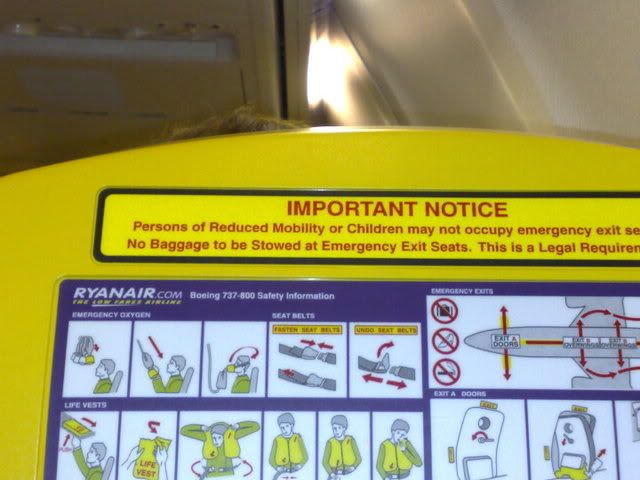Discussion Forum (Archived)
Guest
I am wondering where people get the idea that ‘persons’ is a more appropriate expression than people?
I am an EFL teacher in Poland and it’s a common ‘mistake’ that my students make; saying persons rather than people. Therefore it was a great source of irritation to have a student pass this photo from a prominent discount airline here in Europe. 🙁

What’s the deal?
In the example you give, “persons” might be more appropriate than “people.” A variety of references (see Compact OED, Cambridge Advanced Learner’s Dictionary, and Cambridge Dictionary of American English) say that “persons” is used in an official or legal context. That would fit the airplane sign.
You’ve raised an interesting question, BrianBurnspl.
The AP Style Guide and the NY Times would agree with you; both recommend “people” over “persons,” except in set phrases, like “Missing Persons Bureau.”
“Persons” is indeed a little stilted. But maybe dilettante has a point about the “official” nature of this particular context.
Thanks for that. At least the New York Times is siding with me.
I have two more questions:
1) Why the split? Which came first? People or persons?
2) What’s with the inconsistent capitalization in the above sign? (See what I’m doing? I figure that if I can show that the author doesn’t even know how to capitalize, it means that they are wrong, wrong, wrong.)
and one comment:
I think that it’s significant that I am teaching English as a foreign language and I have begun to internalize some of the over-simplification that is printed in the more elementary course books. Thank God that my students have their eyes open.
“Persons” could mean “a person or more”. I know that sounds silly but it seems to stress the fact of the need of the attention of the individuals present (provided they can read, oops…). But, seriously, “people” could be all over the world, “persons” could be those who are there (i.e., at the airport, on the construction site, standing next to a nuclear silo, etc.). It seems to catch the attention. And I think that’s the purpose of most (if not all) vernaculars of public notices: to catch the attention. Although, the attention caught may not be positive, as in cases like these, with wordings not taught/learnt at primary and secondary school. Other than for the purpose of formal address and urgency, it sounds like the persons writing the signs used babelfish or the “English as she is spoke” method…
Martha Barnette
Grant Barrett
Grant Barrett
1 Guest(s)


